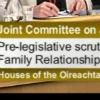One Family’s Guide To Coping with Pressure at Christmas
Christmas can be a wonderful time. It can be a time when we come together to celebrate the passing of another year and to look forward to beginning a new year full of potential and possibility. It can be a time of re-connecting with our family and friends and remembering those who are no longer with us. Yet for all that, it can be a time of enormous stress and for some people tremendous loneliness. Images of happy faces and perfect families in media ads may not match the sadness and pain we may be feeling inside.
Dealing with Conflict
Many of the worst arguments happen at Christmas. Bored children, being cooped up with relatives, the availability of alcohol, and a sense of claustrophobia can create an environment where tensions are high.
- Try to pre-empt possible arguments by planning access arrangements in advance
- Try to communicate in a direct, open and honest manner
- Don’t meet another person’s anger with your anger
- Respect yourself even if the other parent shows you none
- Get out for a walk with the children – tire them out
- Have a bath or take a nap to get away from everyone
- Be prepared to let some behaviours go over the Christmas period
- Be willing to compromise if necessary
- If your child complains about the other parent, try encouraging them to talk directly with that parent
- Keep adult communication directly between adults. Refuse to use your child as a go-between
Financial Management at Christmas
It’s a really good idea to make a commitment to yourself that you will not over-spend this Christmas. The next step is to budget. The earlier you sit down and budget for the holiday the better. Here are some sample categories which might help:
| Category | Items listed in detail | Estimated cost | Total cost |
| Regular food shopping for 2 week period | |||
| Food and drink for specific days i.e. 25th, 26th, 1st | |||
| Decorations – Lights, Christmas tree etc | |||
| Gifts for children | |||
| Gifts for other family members and friends | |||
| Clothing | |||
| Heating, Lighting | |||
| Telephone | |||
| Christmas cards and postage | |||
| Travel expenses | |||
| Socialising | |||
| Miscellaneous |
Be very realistic – Remember the presents are only the start. Making a realistic list of the expenditure will make it easier to see where you can economise.
Be honest – Can you really afford to fund such a sum? If the answer is no, you must cut back.
Be wary of credit – If you find that you need short-term credit to bridge the gap between normal income and abnormal expenditure at Christmas, decide how you will fund this. Your main options are credit cards, bank or credit union loans or authorised overdrafts. All have advantages as well as disadvantages. Whatever you decide, make sure you can afford to meet the costs of the credit, including interest, after Christmas. Avoid unauthorised lenders.
Dealing with Pressure from Children and Young People
Talk to them – It can be really helpful to talk to your children early on about Christmas and explain that you all have a tight budget to work with. If Santa is coming to your house explain to children that Santa has a lot of children throughout the world to visit on Christmas Eve and he has asked parents to tell children to list their top three presents but to expect only one of these, and to understand that he has a budget. It is better to explain to your child that you cannot afford very expensive presents rather than overstretching yourself and getting into debt.
Get them involved in planning – Planning the Christmas with children and young people can help them better understand the pressures of Christmas. It can also be fun working together and help children gain a sense of responsibility.
Self talk – Remind yourself that you are not letting your children down by not getting them exactly what presents they want. Value the love you give them every day of the year. In years to come it will be this they remember rather than how much you spent on them.
Expectations – Remember for many younger children it isn’t the cost of the item that interests them but what they can do with it. Children often find the box more exciting than the gift itself!
Don’t give in to pressure – Children and young people often make demands of their parents. Parents may fear that if they don’t give the child the present they want, then he or she won’t love them. Remind yourself the value of saying “no”. Saying no can help a child understand choices and disappointments. It is far worse for the child or young person to see you upset and anxious about financial difficulties.
Fun Things To Do with Children
Whether you’re with your children for all of the holiday period or have access at certain times, finding fun activities appropriate to the season that don’t cost a lot can be a challenge. Here are some ideas:
- Christmas carols
- Christmas lights – Take your child into your nearest town or city to see the lights at night or take a tour of your locality
- Decorate your tree together
- Feed the ducks or swans, or put out a bird feeder together. Animals can find it hard to get food this time of year
- Check out your local library for details of free activities held for children over December and January
- Bake a cake together
- Make homemade sweets and cookies to give out as presents
- Make a jig saw together
- Visit your local art gallery, most galleries have free activities and workshops for children with materials provided
- Go swimming
- Visit your local park, or the botanical gardens in Dublin to watch the squirrels
- Have books and DVDs ready to entertain
- The national concert hall in Dublin hold a range of events for children
- Visit museums – our national museums have free admission and offer many family-friendly tours and activities
- Wrap up well and get plenty of fresh air
- Winter picnics can be fun too – bring a flask and check out adventure playgrounds in your area
- Make Christmas decorations – it’s easy and fun to string together pop corn to hang on the tree, or paper chains
- Visit a pantomime – matinees are usually offered at a reduced cost
Part one of our Christmas Guide includes advice on Taking the Stress out of Christmas, Christmas Alone, and Coping with Sad or Painful Memories. Click here to read it.
For help and advice
One Family askonefamily Lo-call Helpline | 1890 662 212 | support@onefamily.ie
The Money Advice and Budgeting Service | 0761 07 2000 | www.mabs.ie
Citizens Information Helpline | 0761 07 4000 | 9am to 8pm from Monday to Friday
The Samaritans | 1850 60 90 90 | 24 Hours service
Aware – Defeat Depression | 1890 303 302 | 10am – 10pm from Monday to Sunday





